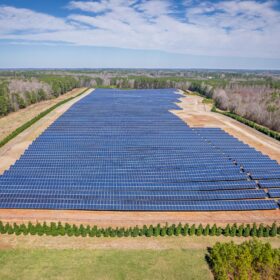BlackRock acquires developer National Renewable Solutions
The acquisition is aimed at helping NRS accelerate work on its more than 3.5 GW pipeline of solar and wind projects.
Lagunitas Brewery serves up solar-brewed beers
In this case study, LG solar takes a deep dive on the company’s work with Lagunitas Brewery, showing the struggles overcome and the innovation needed to deliver the best beer the sun can brew.
Voters in the West support a Federal Clean Electricity Standard
President Joe Biden’s proposed Clean Electricity Standard received bipartisan support among voters in Colorado and Arizona, states that have already enacted their own standards.
Who is working against distributed solar: State campaigns in the Midwest and West
A new report explores who is behind efforts to curb distributed energy and solar deployment. In this part, we look at the report’s investigation of state-level campaigns focused on the Midwest and West.
U.S. to net-zero carbon by 2050 will be a steep climb
Under one scenario, Worley and Princeton estimated that the U.S. would need to build 800 MW of solar every week for the next 30 years to achieve carbon neutrality.
Farmers opting for solar leases over carbon sequestration contracts
In a recent Purdue University survey, farmers reported adopting solar leases at more than double the rate of carbon sequestration plans as a much higher price-per-acre was offered.
New Jersey is set to pass two key pieces of solar legislation
S2605 establishes a successor to the state’s solar renewable energy certificate program, incentivizing the development of at least 3,750 MW of solar, while S3484 would establish a dual-use solar project pilot program for unpreserved farmland.
GM creates $25 million grant program for EV climate equity
The fund joins the automaker’s $35 billion investment in electric and alternative vehicles globally through 2025.
NREL and LADWP will focus on energy justice as the city pursues a carbon-free future
The effort is a follow on to the LA100 study and will bring together environmental justice and other stakeholders to identify community-driven, energy-just outcomes, particularly for people in disadvantaged communities.
Does the Southeast need wholesale power markets in order to hit its renewable goals?
A new report from ACORE, the American Clean Power Association, and SEIA explores the benefits of instituting real-time, wholesale energy markets across the 12 Southeast states as a way to accelerate renewable resource adoption.















